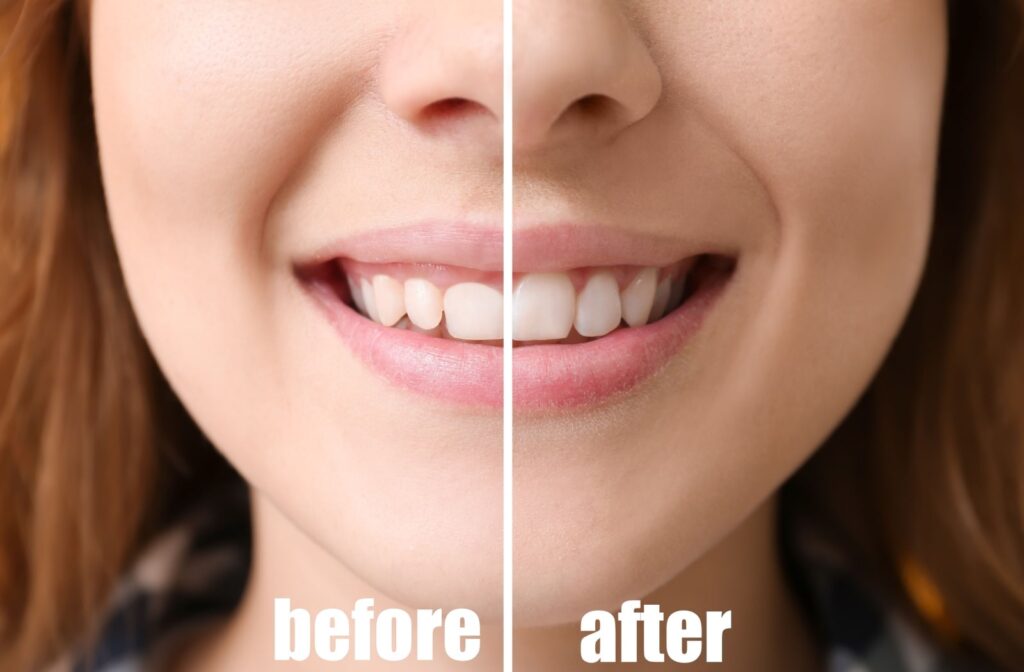What Is Teeth Contouring?
Regular dental care, such as dental exams and professional cleaning, forms the basis of preventative dentistry and can improve the health and appearance of your teeth and gums. Cosmetic dentistry treatments can also improve the aesthetic appeal of one’s teeth and smile.
One such procedure is teeth contouring, a subtle yet effective method to correct imperfections like crooked, misshapen, or overlapping teeth. Whether you’re considering it for the first time or just curious about the process, speak to your dentist to decide if it’s right for you.
What Is Teeth Contouring?
Teeth contouring, also referred to as tooth reshaping, is a dental procedure that involves altering the tooth’s length, shape, or surface of a tooth, bringing it back into line with the rest of your smile. It can be performed alone or combined with other cosmetic procedures.
The goal of teeth contouring is commonly to smooth out imperfections such as:
- Small chips
- Overlapping edges
- Irregularly shaped teeth
- Uneven teeth
- Poorly aligned teeth
- Issues from teeth grinding
- Teeth imperfections that make it hard to clean in between teeth
Teeth Contouring Process
The teeth contouring process begins with a dental consultation to discuss your goals and assess whether you are a suitable candidate. During the actual procedure, your dentist will remove small amounts of enamel and gently sculpt the tooth to achieve the desired effect.
Because the hard enamel on the tooth’s outer surface protects the tooth and the insides of the tooth, the procedure is limited to how much tooth enamel can be removed so it doesn’t expose the tooth to damage. As enamel can’t grow back, this also makes it an irreversible procedure,
Your dentist can also combine teeth contouring with bonding. Bonding adds material to increase the tooth’s size and shape, allowing more flexibility in their overall adjustments.
Candidates Suitable for Teeth Contouring
Teeth contouring is widely available in dental practices that offer cosmetic dentistry services. Booking a consultation with a reputable dentist is the first step to understanding whether teeth contouring is the right option for you.
Teeth contouring is ideal for individuals with healthy teeth and minor cosmetic issues. Good candidates for teeth contouring have enough enamel to support the reduction process without compromising the tooth’s strength and healthy gums and teeth.
Teeth contouring isn’t suitable for anyone with unhealthy gums, decayed teeth, or infected pulp. It’s also not a solution for more severe dental concerns that may require orthodontic treatment.

Benefits of Teeth Contouring
Teeth contouring offers more than just cosmetic benefits. It can positively impact your dental health by improving bite alignment and the ease of cleaning teeth.
Improved Aesthetics
By reshaping less than aesthetically pleasing areas, teeth contouring helps create subtle changes in shape that can significantly improve its appearance.
Enhanced Smile Symmetry
Symmetry plays a key role in smile aesthetics. Teeth contouring can bring harmony to your smile by producing uniformity of each tooth so that it’s proportionate to other teeth.
Correcting Minor Imperfections
Issues like uneven edges and surface pits can be quickly addressed with tooth reshaping for immediate improvements to your overall smile.
Effective & Quick
Tooth contouring is usually completed in a single visit and requires no anesthesia for minor adjustments.
Can Address Some Dental Concerns
While it’s only a cosmetic dental treatment, teeth contouring can address some dental concerns, such as improving damage from grinding your teeth and making cleaning the areas between teeth easier.
Considerations for Tooth Contouring
Like any dental procedure, teeth contouring has its considerations. Understanding the potential risks is important before making an informed decision.
The main risk associated with teeth contouring is the thinning of the enamel, which could lead to increased tooth sensitivity. Over-contouring a tooth may also result in more extensive dental work later.
Tooth Contouring Aftercare & Maintenance
After teeth contouring, you may experience mild discomfort or some sensitivity. Your dentist will provide aftercare instructions for proper healing. Maintaining good oral hygiene is also vital, as are regular dental check-ups to monitor your dental health.
Here are some aftercare tips for tooth contouring:
- Gentle brushing with non-abrasive toothpaste and flossing.
- Avoid chewing on ice and non-food items like pens and fingernails that can harm the enamel.
- Don’t smoke or use tobacco products.
- Visit your dentist at least every six months.
Cost of Teeth Contouring
The cost of teeth contouring varies depending on factors such as the extent of the procedure and the dentist’s expertise. While the cost is generally less expensive than other cosmetic procedures, such as veneers or crowns, teeth contouring can still significantly improve the appearance of your smile.
Personalized Solution for Minor Imperfections
Teeth contouring is a valuable cosmetic dental technique that can provide aesthetic and functional benefits for the right candidate. By understanding the process, benefits, risks, and costs associated, you can make an informed decision regarding your dental health.
Your dentist can evaluate your unique situation and provide personalized advice for minor imperfections. If you’re considering this procedure, book an appointment with Dentistry on Danforth to learn more.


